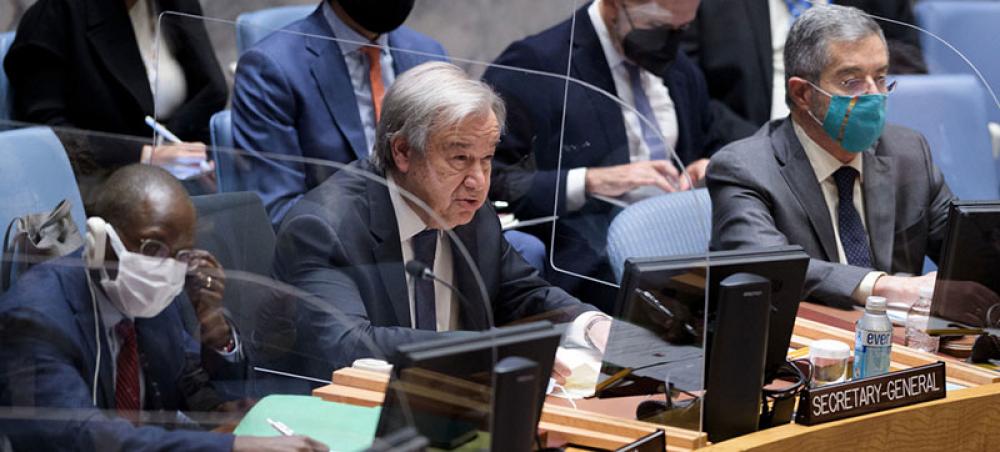Just Earth News | @justearthnews | 17 Nov 2021, 07:15 am Print
 Conflict
Conflict UN Photo/Manuel ElÃas
New York: Preventing conflicts requires closing development gaps, shrinking inequality and bringing hope to people around the globe, senior UN officials told the Security Council on Tuesday.
“History has shown that conflicts do not emerge out of thin air, nor are they inevitable”, Secretary-General António Guterres said.
Too often, they result from lack of access to basic services and life staples – such as food, water and health care – or from gaps in security, laws and governance systems.
Conflicts can also be sparked by gaps in public trust, both in institutions and in one another.
“These gaps are potential flashpoints for violence and even conflict”, spelled out the UN chief.
That means not only defusing tensions through dialogue, but also ensuring that no mother is forced to skip a meal to feed her children. Closing development gaps and bringing people hope can help stabilize societies and reduce the inequalities that stoke conflict.
UN prevention toolkit
The UN chief emphasized that for 76 years, the UN has given the world “a home for dialogue, as well as the tools and mechanisms necessary for the peaceful settlement of disputes”.
Citing the judicial dimension of prevention – provided by the Hague-based International Court of Justice – as well as the Economic and Social Council’s work to advance sustainable development, he also recalled his own calls for a surge in diplomacy and conflict prevention efforts.
Those efforts have included reviews of all the tools comprising the UN’s peace architecture, better integration of prevention and risk-management and more innovation and foresight.
Another crucial tool is the UN’s increasingly close partnerships with regional and subregional groups, such as the African Union, which bring critical in-depth knowledge of dynamics on the ground.
He highlighted the Our Common Agenda report, which takes a holistic view of global security and proposes a new social contract.
Drivers of instability
President of the General Assembly Abdulla Shahid said that over the decades the UN has learned more about the link between socioeconomic factors and conflict.
Spotlighting some of today’s most critical emerging challenges, he pointed to the COVID-19 pandemic as exacerbating socioeconomic struggles and inequality; the climate crises that threaten displacement; and ineffective institutions that rob people of hope.
Meanwhile, the absence of democratic participation, political freedoms and equality deprives entire populations of their human rights.
While global security will always fall under the Security Council, he maintained that it can be complemented by the Assembly and the Economic and Social Council’s (ECOSOC) efforts to build more resilient and prosperous communities.
Economic and social dimensions
ECOSOC President Collen V. Kelapile recalled that organ’s mandate to promote the economic and social advancement of all peoples, protect human rights and oversee the UN’s development and humanitarian systems – drawing links to conflict prevention.
Suffering continues in Africa’s Sahel region “because of the failure to appreciate the complex interplay of human survival, in a very fragile and culturally diverse environment”, he said.
And extreme poverty in South Sudan is rooted in over 50 years of conflict, while Haiti’s vast challenges stem from historical and structural inequality, governance deficits and vulnerability to climate change.
However, despite the UN’s interlinked mandates to address such crises, interactions between them have remained sporadic and ad hoc.
“Today’s complex challenges require more institutionalized collaboration”, Mr. Kelapile underscored.
Dispute settlement at the ‘World Court’
Also briefing the Council, President of the International Court of Justice Joan E. Donoghue explored ways that the body can contribute to conflict prevention.
She said that States may resort to the Court as a means of dispute settlement to defuse tensions over resources, land or water boundaries or other sources of potential conflict.
While the circumstances and requirements of each case vary, Ms. Donoghue said that all the principal UN organs have the opportunity within their respective purviews to help implement the Court’s judgments and contribute to the promotion of peace, security and justice.
“The Court itself stands ready to receive any requests for advisory opinions that relevant UN organs and specialized agencies may make”, she upheld.
- United Kingdom launches eVisa for Indian visitors starting today — Here’s what travellers need to know
- Abandoned at birth, Punch the macaque finds global love as crowds flock to Tokyo zoo
- YouTube Premium Lite just got a massive boost — Know all details
- Trump claims he stopped 35 million deaths by stopping India-Pakistan war
- Entrepreneur decides to shut down 16-year old eatery in London, cites harassment and Pakistani attacks





-1763561110.jpg)
